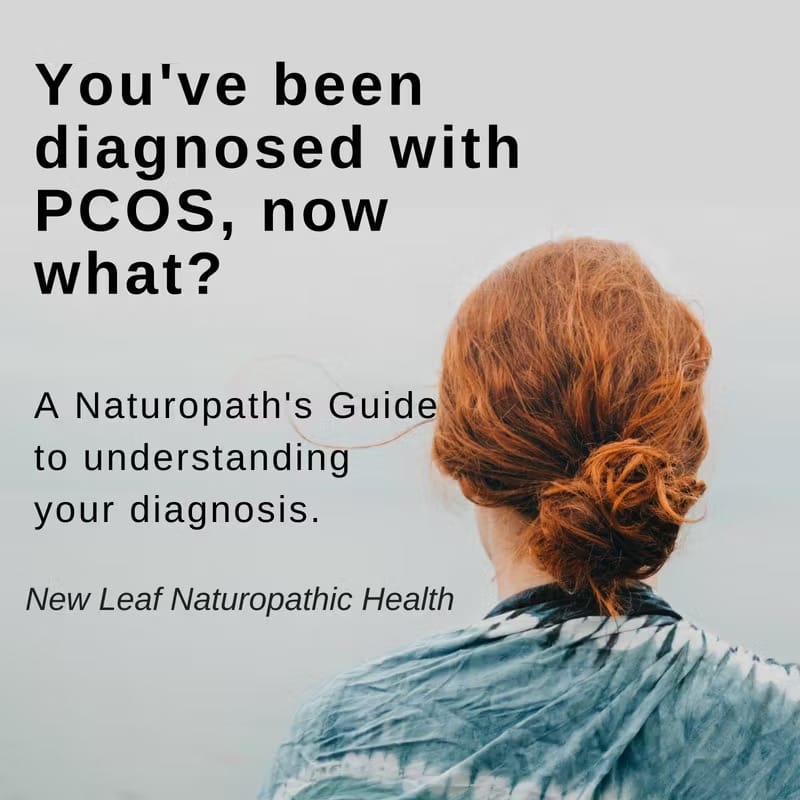
This is a picture I often see in our naturopathic clinic: A young women who has stopped getting her period comes in with a diagnosis of PCOS. But does she really have PCOS? Or is it something else? You're wondering what to do after your PCOS diagnosis.
Can naturopathic medicine help?
Should you go on the Pill?
What dietary changes are needed, if any?
How can you get your period to be regular again?
PCOS or polycystic ovarian syndrome is a collection of hormonal symptoms that present in a number of different ways such as reduced fertility, acne, excessive hair and sometimes (but not always) changes in weight. Women with missing or irregular periods are often diagnosed with PCOS. If this is you, then it’s worth doing some investigation to make sure your diagnosis, and treatment, is right. There are a number of reasons why your period may have disappeared. And all is not lost. With the right approach and a clear diagnosis, you can get your period back.
To be diagnosed with PCOS GPs in Australia need to follow strict guidelines from The Rotterdam Criteria. This means a number of different tests need to be carried out for the diagnosis to be 100% certain. And too commonly these are not being done.
To be diagnosed as having PCOS in Australia women need to have two of the following symptoms from the Rotterdam criteria:
I commonly see women at my clinic who have been diagnosed with PCOS from ultrasound alone – and this just is not right.

So here is the New Leaf checklist of what you should do once you get your PCOS diagnosis:
The first step in getting a clear diagnosis of PCOS is to ask your doctor for some blood tests. These would include screening for fasting insulin, androgens, including testosterone, and other hormones, such as sex hormone binding globulin (SHBG), luteinising hormone (LH), follicle-stimulating hormone (FSH), oestrogen, and progesterone.
These tests should give us a clear picture of whether you have classic insulin resistance polycystic ovarian syndrome.
On these tests we will commonly seen low SHBG, and raised testosterone and androgens. Depending on where you are in your cycle the oestrogen and progesterone, LH and FSH will provide answers around what is happening to your ovulation as well.
As well as getting pathology it is important to ask the following questions because there are a number of other causes to be ruled out for women with amenorrhea ( lack of periods) or oligomenorrhea (in infrequent periods).
You cannot diagnose PCOS for someone who is on hormonal birth control.
What’s more, it can take a while for women who have stopped birth control to regulate their cycle.
Sometimes we work with women for over a year to get a regular period to return. In this case. Blood tests commonly show an inverse of the pathology for PCOS. So you may have high SHBG, low testosterone but your insulin may still be high depending on your diet and the impact that the pill has had on you.
It is bestto wait until a few months after you have stopped the pill before going through a thorough investigation for PCOS. In the meantime working with a naturopath to help balance your hormones naturally will see the return of your period sooner rather than later.

This is also a really important question to ask yourself if your periods are irregular, or if they have disappeared altogether. We call this hypothalamic amenorrhea (HA), And it is very common, particularly with women who are exercising a lot, counting calories and dieting – and especially those avoiding carbohydrates altogether. The ovaries of these women will look polycystic. The danger with these women being diagnosed with PCOS, is that the advice from the GP will be to lose weight and diet – potentially causing more damage to their ovaries and their ability to ovulate.

The next thing to do is to wait. This is the hardest part, I know. We will get your period back with the right treatment, supplementation and herbal medicine. But it can take time.
Doctors commonly prescribe the pill to regulate menstrual cycles. It is important to realise that the Pill will not regulate your cycle as the Pill commonly stops women from ovulating which is the very thing we need your body to do naturally.
Eat happy and follow the guidelines of your nutritionist or naturopath. Different causes of amenorrhea deserve different treatment plans, so there isn’t necessarily a one-size-fits-all approach to diet for women with no periods.
So if you are confused by your diagnosis of PCOS and you’re still waiting for your period to return please speak to New Leaf – we are here to help and listen to your story.
I am a huge advocate of the woman’s right to choose how their body is treated, and to improve your quality of life and promote Women’s Health. We need a our hormones and sometimes they are elusive.
New Leaf Naturopathic Health provides clinical nutrition, herbal medicine and naturopathic care to people all over Australia. We specialises in wholefood eating, mental health, plant-based diets and hormone balancing. Book an appointment with one of our practitioners today to gain the tools you need to develop a healthy, balanced approach to health.